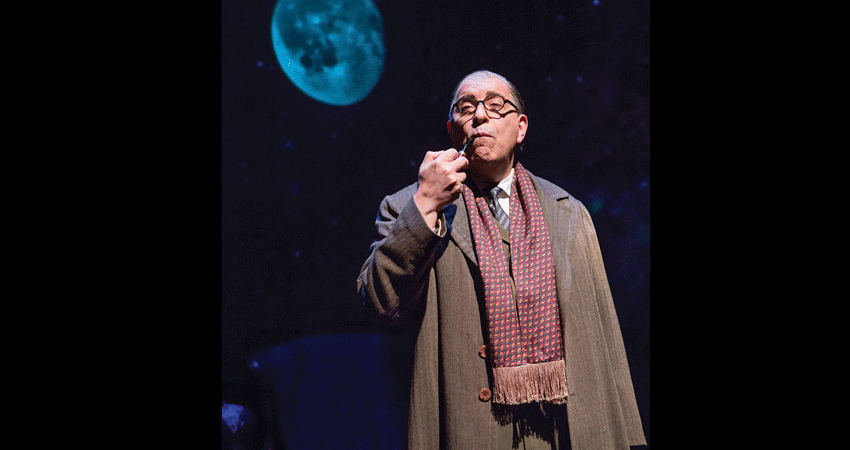One-Man Show Comes to Columbia University
By Nathan Barlow, Columbia ’20
For students involved in campus evangelism, the life of C.S. Lewis offers an interesting case study as his path from apostasy to faith took place in the halls of the academy. On October 1, the Fellowship for Performing Arts brought its one-man play, C.S. Lewis: The Most Reluctant Convert, to the Roone Arledge Auditorium at Columbia University. The event was sponsored by several ministries, including Columbia Reformed University Fellowship, Christian Union at Columbia, and the Veritas Forum.

C.S. Lewis: The Most Reluctant Convert, an 80-minute play, included a series of monologues taken from Lewis’ autobiographical works. Max McLean’s portrayal of Lewis and the detailed set design allowed the viewer to suspend disbelief and feel like a fly on the wall in his study.
Lewis’ monologue covered events from his early childhood, all the way to his eventual conversion at age thirty-two. The rear wall of the study featured portraits of all the characters in his life’s tale, while music and sound effects played sparingly to enhance the drama.
The first few segments of The Most Reluctant Convert concerned his mother’s untimely death, his father’s harsh and blustery parenting style, and his gradual disillusionment with church and his increasing philosophical materialism. At boarding school, he became a thoroughgoing atheist, and his interest in mythology and the occult increased. Lewis went on to study at Oxford, which World War I interrupted. As a decided atheist, he refused to pray even in the face of great danger during his time on the front.
When he returned from the war and resumed his studies, Lewis’ opinion of Christianity and theism more generally began to change. In the most hair-raising portion of the play, he imitates a classmate who writhed around screaming about demons pursuing and harming him. The classmate had been a committed atheist, and, like Lewis, had flirted with occultism. This experience marked the first in a chain that made Lewis doubt his haughty scientific materialism. He began to wonder about supernatural phenomena.
After one of his literary friends became a theist, and after befriending Christians like J. R. R. Tolkien, Lewis had a harder and harder time fending off their philosophical attacks on his materialism. At first he admitted to believing in some kind of God, then he could not resist accepting the most well-attested and consistent theism, Christianity. Long walks with his Christian friends pushed him into the arms of Jesus. The show ended as the screen behind the stage became the interior of his parish church, while Lewis described receiving his first communion as a renewed Christian. This ending captured how intellectual development and loving personal relationships often weave together to bring about conversion.
In the Columbia Spectator, McLean said he was drawn to Lewis’ ability to perceive not only from a theological perspective, but from a multifaceted one.“[Lewis] sees both sides,” McLean said. “Most of our educational system really is viewed on the material side—we have minds, nobody knows where they came from, but we can make iPhones, so who cares, right? Whereas, a religious view says, ‘no, I kinda care.’”
After the show, McLean returned to the stage in street clothes to answer audience questions. He first described the process of writing the script: meticulous research, reading everything Lewis wrote and everything written about Lewis. One student asked about the role of this huge undertaking in McLean’s own spiritual development. McLean indicated that immersing himself in the thought of the century’s greatest apologist did wonders for his own faith in the truth of the Gospel.
The actor also discussed how he had initially chosen to dramatize this particular story because he, much like Lewis, was an adult convert. Both Lewis and McLean struggled with philosophical materialism on their journeys back to Christ. Although McLean did not write many words in the script, he noted that his personal conversion experience informed his portrayal.
One student asked whether the play, which has stopped at Berkeley, Brown, and Columbia, had faced any backlash. McLean replied that the near-universal admiration for C.S. Lewis seems to drown out any resistance to his life’s work and story.
Additionally, McLean told the Columbia Spectator that Lewis’ semi-autobiographical novels with clear narratives, such as The Great Divorce, display a unique combination of intellectual thought and raw emotion that lend themselves to theatrical presentations. On a fall evening at Columbia University, McLean’s theatrical presentation of C.S. Lewis: The Most Reluctant Convert was successful in presenting a compelling Gospel testimony to converts and skeptics alike.












